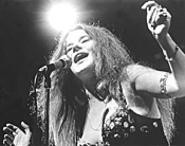Have you seen Janis Joplin? Unless you attended one of the three "Festival Express" concerts in Canada in the summer of 1970 -- and unless, actually, you were on that cross-continental train -- you've never seen her like this. Here she is, laughing with Jerry Garcia in the bar car. He tells her he's always loved her, and she breaks into a goofy smile, a little froggish, actually, from behind purple sunglasses. Here she is on stage, feather boas in her tangled mane, confessing her sins to the audience, belting out the sorrows of being a fool for love. Here's a close-up of her weathered face, at 27 still scored with acne, but also wrinkling, showing the signs of her hard living. It's only a few months before her way-too-early death, and she's a heartbreak. There's just no saving her.
There are other delights to Festival Express, a documentary from director Bob Smeaton chronicling a five-day train trip through Canada that hosted an entire festival of rich talent: the Grateful Dead, the Band, Buddy Guy, the Flying Burrito Brothers, Ian & Sylvia, and even (for one ridiculous, gold-suited number) Sha Na Na. Festival promoters Ken Walker and Thor Eaten seemed far less concerned with making money than with providing the performers with a sublime musical experience: a seemingly endless meander through the countryside, dining car and bar fully stocked, making music with each other.
According to Phil Lesh (of the Grateful Dead), it was "a train of insane people careening across the Canadian countryside, making music night and day . . . and then occasionally we'd get off the train to go play a concert." His bandmate Mickey Hart reports, "Everything was constantly revolving. There was a blues car, a country car, a rock-and-roll car. It was like musical chairs. There was never anything like that level of talent and musicianship encapsulated in such close quarters for that length of time." And blues great Buddy Guy confesses, "Every time I went to bed, I was afraid I would miss something." He never lasted even an hour in his berth.
Festival Express is essentially a concert movie, with several extended numbers from each of the film's major players. It does, however, spend some time with the performers as they drink, make music, and tell stories on the train. It also features contemporary interviews, with promoter Ken Walker (hunched and hilarious), Buddy Guy, Phil Lesh, Bob Weir, Mickey Hart, and others. For these, Smeaton makes excellent use of the split screen, juxtaposing the current footage with the performances and, sometimes, the performances with shots of the audience, or shots of the police attempting to keep protesters at bay.
Yes, there were protesters. There's not much conflict in Festival Express -- mostly, everyone is too busy having an unprecedented blast -- but what there is issues from the young Canadian hippies who, offended by the $14 festival-ticket price, decided to demand free admission. "They were pathologically antiauthoritarian," the Dead's Bob Weir says. "I know. I'm that way myself." It's amusing to watch the young counterculture concertgoers protest the slightly older counterculture performers. But lovely, groovy Jerry Garcia is not offended. He asks politely for peace -- "We would like to have a half hour of just coolness" -- and then arranges a free concert in a nearby park. Aw, Jerry.
Festival Express comes to us by way of a Herculean recovery effort. Initially intended for a documentary film, the footage was scattered throughout Canada when the festival promoters and original film producer feuded. Some of the reels made it to the Canadian National Archives, where they languished for nearly 25 years. When the film was unearthed there, only 46 hours of the 76 shot remained, and it took another 10 years to synch the audio, clear the performance rights, shoot contemporary interviews, etc. The result is, as the press material promises, a piece of rock-and-roll history -- but it isn't perfect.
The film offers multiple pleasures, but all the drama is in the performances. Most everything else is just a mellow, hazy trip. And while the performers are reported not merely to have lived, slept, and rehearsed on the train but also to have done "countless unmentionable things," we never see these unmentionables. We don't even hear about them.
Perhaps the funniest line comes from Walker, who seems not to regret a moment of the five-day tour, on which he lost an untold sum. But then he says: "I think the lesson I learned was that I gave the public too much. And they didn't deserve it." Maybe they didn't, but the performers did, and Walker gave them a gift that seems to have been universally appreciated. "The next time you throw a train, man," Joplin says, "invite me!"


